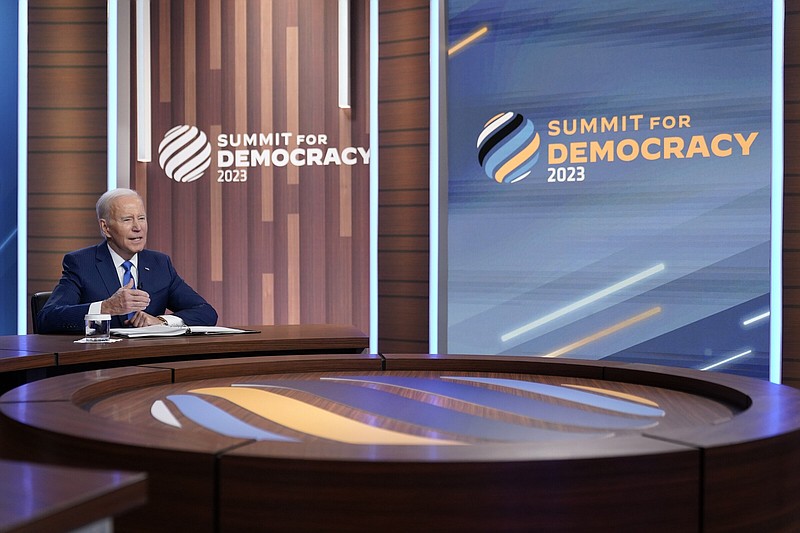WASHINGTON -- President Joe Biden on Wednesday offered an optimistic outlook on the health of democracy worldwide, declaring that leaders are "turning the tide" in stemming a yearslong backslide of democratic institutions.
Opening his second democracy summit, Biden looked to spotlight hopeful advancements over the past year despite Russia's war in neighboring Ukraine and U.S. tensions with China over its military and economic influence in the Indo-Pacific and beyond.
The president cited signs of progress across the globe, from Angola's effort to create an independent judiciary, Croatia's move to boost government transparency and the Dominican Republic's anti-corruption steps. At home, Biden pointed to his stalled push for voting protections in Congress as evidence of his administration's commitment to support democracy.
"Today, we can say, with pride, democracies of the world are getting stronger, not weaker," Biden said. "Autocracies of the world are getting weaker, not stronger. That's a direct result of all of us."
The summits, which Biden promised as a candidate in 2020, have become an important piece of his administration's effort to try to build deeper alliances and nudge autocratic-leaning nations toward at least modest changes.
He said the U.S. will spend $690 million bolstering democracy programs -- supporting everything from free and independent media to free and fair elections -- around the world. He said he also wanted to use the summit to foster discussion about the use of technology to "advance democratic governance" and ensure such technology is "not used to undermine it."
The U.S. also signed a statement with nine other countries to deepen international cooperation on countering the proliferation and misuse of commercial spyware. Australia, Canada, Costa Rica, Denmark, France, New Zealand, Norway, Sweden, Switzerland, and the United Kingdom signed on the agreement.
About 40 participants had signed on, as of Wednesday, to a set of guiding principles for how governments should use surveillance technology, according to a senior administration official who spoke on condition of anonymity to preview the agreement before its formal announcement. The guidelines are to be published before the close of the summit today.
The White House announced plans for the U.S. Cybersecurity & Infrastructure Security Agency to partner with nine other countries to work on protecting human rights and other activist groups that are at risk of facing transnational cyber attacks. The UK is co-leading the effort and Australia, Canada, Denmark, Estonia, France, Japan, New Zealand and Norway have also signed on.
Since Biden's first democracy summit in December 2021, countries have emerged from the coronavirus pandemic and Russia invaded Ukraine, the largest war in Europe since World War II.
Ukraine's president, Volodymyr Zelenskyy, pushed back at those suggesting it was time for a negotiated settlement with Russian leader Vladimir Putin. "We should get rid of the illusion that compromising with evil can give something to freedom, and enemies of democracy must lose," Zelenskyy told the summit.
The Dutch prime minister, Mark Rutte, said the invasion was a jolting moment for the world's democracies.
"For decades, the idea of war in Europe seemed unthinkable. But we were wrong. As Russia's brutalization of Ukraine has shown, we cannot assume that democracy, freedom and security are givens, that they are eternal," Rutte said.
The U.S. hosted the last summit on its own. This time, it recruited four co-hosts -- Costa Rica, the Netherlands, South Korea and Zambia -- after ambassadors from China and Russia criticized the first summit and accused Biden of causing a global divide with a Cold War mentality.
Information for this article was contributed by Munir Ahmed, Tom Verdin, Daniel Politi, Seung Min Kim, Ellen Knickmeyer and Colleen Long of The Associated Press.
